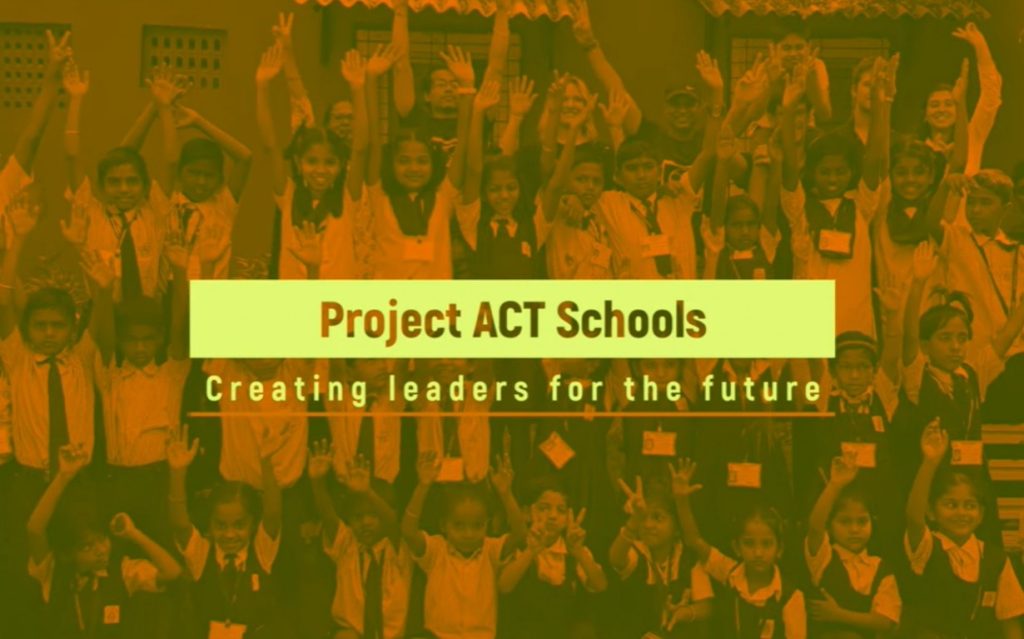
Mumbai School Project: In Partnership With Swiss Staff Foundation For Children In Need
1 in every 40 primary schools in India is conducted in tents or open spaces with unqualified teachers
Every child should have access to basic education and technology to help create a better future for them and the nation. Unfortunately, that is not the case. There are millions of children and numerous schools all over the world who cannot acquire basic necessities.
One such example is of a school in Mumbai Municipality Area where there are 1,400 kids with only one water filter available, no benches to sit on, shortage of technological equipment, filthy condition around school leading to sickness and unhealthy environment, all of these lead to an increased number of school dropouts.
Insufficient funds are allocated to rural regions and primary schools depriving children in rural areas of primary schooling in buildings
We can’t help each one of those schools but we can start with one.
CREATING A SUSTAINABLE MODEL OF SOCIAL CHANGE THROUGH PROJECT SUSTAINABLE SCHOOLS
Sustainable School Project is based on a circular economy model where communities are trained to make a sustainable living. This is done while cleaning up the local ecosystem and recycling or upcycling the waste to generate monetary benefits.
The Project focuses on key problems and provides a sustainable solution to it:
- Benches and desks with storage capacity:
One of the biggest challenges is that chawls lack hygiene and comfortable living spaces. The people have been rehabilitated from slums and given one room, one kitchen and one bathroom space for even a big family. Due to lack of a proper waste management system, the garbage is dumped out on the streets.
This area with filth and garbage leads to the children falling sick results in short attendance and loss of studies.
This project will solve the waste management problem of the locality by running a waste collection program where each house will deposit the waste in the buildings itself and once in a week the waste will get collected and transported. Also, the nearby lakes will be cleaned off the plastic and other wastes resulting in a healthy ecosystem for the people to live in.
The plastics collected from the clean-up will be recycled into benches for the students
This environmental movement supported by many people aims to change the way waste management happens in this particular locality and restore the self esteem of the students who never thought it could have been possible.
This way they will become the recycling heroes of Mumbai.
- School Bags from recycled material:
The plastic bottles collected during the clean-up will be downcycled to manufacture water-resistant school-bags and pouches.
In this manner, plastic waste is brought back into the system and women are given a livelihood. They are useful in all seasons and achieve uniformity amongst pupils as well.
This way the waste won’t go to the landfills or oceans instead, a tool for education will be made from this waste. It will provide a sense of belongingness for the children towards the school who compassionately are putting efforts in the hope of a better future.
- Water Filters:
The schools do not have proper sanitary water facilities. There is just one water filter installed which has to be shared among 1,400 students.
As a result, the majority of students are compelled to consume the unclean and possibly polluted tap water. With regular pipe leakages, the sewage water mixes with the drinking water and 80% of the children have to drink such unfiltered tap water.
To solve this problem, filters and coolers will be set up to provide clean drinking water available to all and to avoid dehydration due to the hot weather of Mumbai.
- Eco-Bricks Garden:
For the first time, this project is created to let the children build their own gardens from scratch by taking responsibility in their hands through environmental activities. The children will eventually become the Eco-Leaders of Mumbai setting an example for the world.
This garden building is a unique project and a proud moment for each child, where they will be making the bricks themselves, learning about waste management, reducing the waste and taking a step to solve the problems of their locality where adults have failed to manage. A step towards a better future and sustainable environment.
- Eco-Bricks Compost Station with Equipment:
Schools try to provide at least one meal a day to each child and this generates a lot of food waste.
The waste remains unsegregated & unattended and ends up in the landfills or dumped outside the schools, causing bacterial growth making the entire area filthy.
To tackle food and other organic waste, a composting unit will be set-up in the school which can be used in Eco Gardens made by these children. A circular economy method where each child will learn to make eco-bricks, a composting unit getting a solution to keep their area clean, and taking over the responsibility of adults.
Hence, the entire area, livelihood, the neighbourhood will become clean and more liveable just because of one simple idea. This will allow them to live the absolute zero waste life too.
- E Waste computers:
Many students are left behind in the later stages of life as they do not have access to computers and the internet.
Every child should have access to basic technology that could help them grow. The idea of collecting e-waste helps in providing refurbished electronics with a warranty.
Hence, repurposing electronic waste for a long-term use in schools.
- Roof-top Solar Panel System:
Many schools do not have a constant and steady source of electricity which leads to low performance of students in schools.
Installation of roof-top solar panel systems will result in a project that not only helps in providing the facilities to the kids through renewable sources but would also help in generating revenues to work for the betterment of their future.
This way, the way the sun shines, their future will shine too.
This will make the school sustainable in itself as the solar panels can last up to 25 years.
WHY WE ARE DOING IT?
Research shows that many educators have expressed a knowledge gap in not only what to teach young children about sustainability but how to go about teaching it. Most children are unaware of the role they play in this society from a young age.
Children must be taught and guarded about the opportunities they have to help out the earth in their own small ways with the right they can learn by doing the right things for a sustainable planet, teaching them about how their actions can impact the environment and the society they live in will help create awareness of their actions and the consequences of their choices.
Funds will be generated to invest in necessities for the children, to help them get better teachers, benches to sit on, technological support and other amenities focussing on their development.
If we have to save our natural resources for the future generation, sustainability has to be embedded in all daily routines and practices.
It is said seeing is believing. Educators need to discuss things with children that all living things are interconnected. This should be followed by action. Learning by doing is what makes sustainability sustainable.
This Sustainable School Project, a UNESCO Recognized Project, will bring the revolutionary change and will act as a pilot model for numerous school structures in future.
– Reported by Namrata Garg, Edited by Riya Dani




